|
De Nederlandse schrijver en vertaler Frans Kellendonk werd geboren in Nijmegen op 7 januari 1951. Zie ook alle tags voor Frans Kellendonk op dit blog.
Uit: Beeld en gelijkenis
“De pastoor had een monotoon stemgeluid dat het onmogelijk maakte om de eucharistie met begrip te volgen. Hij was klein en rond en zijn gezicht was zo rooddooraderd dat het, de huidcrème die hij erop aanbracht ten spijt, in een netje leek te hangen, als een nieuwe plastic voetbal. Op zijn al te vleeskleurige lippen zat roze parellipstick. Hij had wulpse handjes die zich onweerstaanbaar tot elkaar aangetrokken voelden en elkaar onophoudelijk knuffelden en opvrijden. Er werd gefluisterd dat hij het met een vrouw hield.
Op een goede dag kregen we een hulpkapelaan, een jonge Franciscaan met zwart haar en felle bruine ogen, die in zijn sandalen geen sokken droeg van witte zijde, zoals de pastoor, maar blote voeten die rood zagen van de kou. Hij is maar kort gebleven. Eén keer heeft hij gepreekt en de arme gelovigen, die gedoopt waren voor ze ‘pap’ konden zeggen, die elke week trouw hun plaatsengeld en collectegeld hadden betaald, en ook voor de missie-acties regelmatig een kleinigheid hadden afgedragen, die toch mochten menen dat ze al met één been in de hemel stonden, kregen van hem te horen dat ze heidenen waren. ‘Bekeert u!’ snauwde hij hen van de kansel toe. Zo zout hadden ze het nog nooit gegeten. Hij bestond het bovendien om die brave mensen voor zondaars uit te maken. De brave mensen vonden dat hij beter naar z'n eigen kon kijken. Maar ik vond dat getier van hem een weldaad, na de fluwelen dwingelandij waar ik aan gewend was, en toen ik hoorde dat hij wegens zijn te grote ijver spoedig weer zou moeten vertrekken ging ik op een vrijdagavond bij hem te biecht. Terwijl hij achter het luikje nog zat te bidden voor de vorige biechteling, een geruststellend onderkeels gebrom, af en toe onderbroken door een diepe zucht, zei ik mijn oefening van geloof; daarna bekende ik de zonden die ik altijd bekende en hij wilde me al de penitentie opgeven toen ik tenslotte durfde te stotteren: ‘Eh... pater... Pater, ik moet u nog iets zeggen... Ik, eh, scháám me altijd zo vreselijk. En ik weet niet hoe het komt.’
Zo was het precies. Ik, een zondagskind, één en al levenslust en plezier, was me in mijn elfde levensjaar een etterende leproos gaan voelen. Zomaar, ineens.”
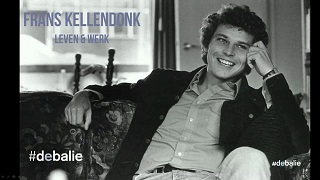
Frans Kellendonk (7 januari 1951 – 15 februari 1990)
Affiche voor een programma in De Balie in Amsteram, mei 2015
De Amerikaanse dichter, redacteur en hoogleraar Reginald Gibbons werd geboren in Houston op 7 januari 1947. Zie ook alle tags voor Reginald Gibbons op dit blog.
Friday Snow
Something needs to be done—like dragging a big black plastic sack through the upstairs rooms, emptying into it each waste basket, the trash of three lives for a week or so. I am careful and slow about it, so that this little chore will banish the big ones. But I leave the bag lying on the floor and I go into my daughter’s bedroom, into the north morning light from her windows, and while this minute she is at school counting or spelling a first useful word I sit down on her unmade bed and I look out the windows at nothing for a while, the unmoving buildings—houses and a church—in the cold street.
Across it a dark young man is coming slowly down the white sidewalk with a snowshovel over his shoulder. He’s wearing a light coat, there’s a plastic showercap under his dirty navy blue knit hat, and at a house where the walk hasn’t been cleared he climbs the steps and rings the doorbell and stands waiting, squinting sideways at the wind. Then he half wakes and he says a few words I can’t hear to the storm door that doesn’t open, and he nods his head with the kindly farewell that is a habit he wears as disguise, and he goes back down the steps and on to the next house. All of this in pantomime, the way I see it through windows closed against winter and the faint sounds of winter.
My daughter’s cross-eyed piggy bank is also staring out blankly, and in its belly are four dollar bills that came one at a time from her grandmother and which tomorrow she will pull out of the corked mouthhole. (It’s not like the piggy banks you have to fill before you empty them because to empty them you have to smash them.) Tomorrow she will buy a perfect piece of small furniture for her warm well-lit dollhouse where no one is tired or weak and the wind can’t get in.
Sitting on her bed, looking out, I didn’t see a bundled-up lame child out of school and even turned out of the house for a while, or a blind woman with burns or a sick bald veteran—people who might have walked past stoop-shouldered with what’s happened and will keep happening to them. So much limping is not from physical pain—the pain is gone now, but the leg’s still crooked. The piggy bank and I see only the able young man whose straight back nobody needs.
When he finally gets past where I can see him, it feels as if a kind of music has stopped, and it’s more completely quiet than it was, an emptiness more than a stillness, and I get up from the rumpled bed and I smooth the covers, slowly and carefully, and I look around the room for something to pick up or straighten, and I take a wadded dollar bill from my pocket and put it into the pig and I walk out.
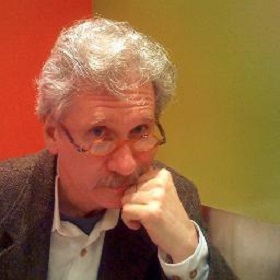
Reginald Gibbons (Houston, 7 januari 1947)
De Canadese dichteres en schrijfster Dionne Brand werd geboren op 7 januari 1953 op Trinidad. Zie ook alle tags voor Dionne Brand op dit blog.
Uit:What We All Long For
“There were Italian neighbourhood and Vietnamese neighbourhoods in this city; there are Chinese ones and Ukrainian ones and Pakistani ones and Korean ones and African ones. Name a region on the planet and there's someone from there, here. All of them sit on Ojibway land, but hardly any of them know it or care because that genealogy is wilfully untraceable except in the name of the city itself. They'd only have to look, though, but it could be that what they know hurts them already, and what if they found out something even more damaging? These are people who are used to the earth beneath them shifting, and they all want it to stop-and if that means they must pretend to know nothing, well, that's the sacrifice they make.”
(…)
“Carla might recognize herself in the lean girls against the bar, the girls in slender-cut suits with silver rings on each finger and thumb who looked so compact and secretive, so much as if all their essences were perfectly locked and kept, and only if you managed to please them could you unlock their fingers and pry them out. They smelled of a different perfume, they never quite met your eyes except in a swift and thorough appraisal whose conclusion you became aware of immediately when their eyes averted without the longed-for approving smile. You longed to go with them to secret apartments in the suburbs or condos on the lakeshore and there have their fingers brush down your back and have their maroon mouths kiss your thighs.”
(…)
“Angie was a border crosser, a wetback, a worker in the immigrant sweatshop they call this city. On days like this I understand her like a woman instead of a child. Everybody thought she was a whore. She wasn’t. She tried to step across the border of who she was and who she might be. They wouldn’t let her. She didn’t believe it herself so she stepped across into a whole other country.”
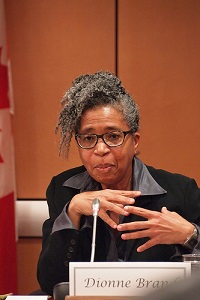
Dionne Brand (Trinidad, 7 januari 1953)
De Finse schrijfster Sofi Oksanen werd geboren in Jyväskylä op 7 januari 1977. Zie ook alle tags voor Sofi Oksanen op dit blog.
Uit:Als de duiven verdwijnen (Vertaald door Marja-Leena Hellings)
“Ze leek de juiste woorden voor de angstige gemoederen te vinden, en wist dat niemand het hoofd mocht verliezen als het tijd was om in de vrachtwagen te stappen. Een beter iemand om de mensen opte vangen had ik niet kunnen kiezen.
De anderen waren wantrouwig geweest toen ik had aangekondigd dat ik een nieuwe woning als verzamelplaats had gevonden en een nieuwe persoon om de vluchtelingen op te vangen, ik had Juudit Linda genoemd. Ik had met de hand op mijn hart gezworen dat ze betrouwbaar was, over haar relatie met een mof had ik niets gezegd.
Ik hield mezelf ook voor dat, hoe meer Juudit hierbij betrokken was, hoe zekerder het was dat ze haar mond zou houden. Beetje bij beetje liet ze nuttige informatie los en het leek alsof ze steeds meer ging twijfelen aan alles wat met de Duitsers te maken had.
Deze keer was bijzonder onrustig. De toespraak van Hjalmar Mäe had bij sommigen iets van hoop gewekt, volgens Mäe zou mobilisatie de eerste stap naar soevereiniteit zijn. Ik zag aarzeling op de gezichten van de vluchtelingen, de wil om geloof te hechten aan de woorden van Mäe. Ik bleef me verbazen over de goedgelovigheid van de mensen. Of de wanhoop. Toch was het aantal van hen die niet meer geloofden in de overwinning van Duitsland en in de beloften van de staat over onafhankelijkheid of autonomie van Estland met de dag toegenomen. Niemand wilde blijven wachten op een nieuwe slachtpartij, men wist zeker dat de bolsjewieken zouden komen. De kerkleiders hadden het over de terugkeer van de goddeloze staat.”
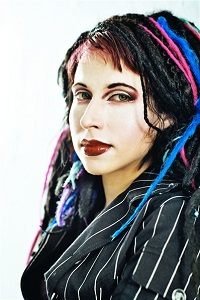
Sofi Oksanen (Jyväskylä, 7 januari 1977)
De Nederlandse dichter, bloemlezer Henk van Zuiden werd geboren in Apeldoorn op 7 januari 1951. Zie ook alle tags voor Henk van Zuiden op dit blog.
Kwijt
voor Charlotte Meijer
Ik kan mijn pen verliezen, of een ringetje,
mijn geduld, een jerrycan, mijn gezicht,
een sleutel, mijn moeder, en dat is geen dingetje,
mijn melktanden in witte zakdoek met gedicht,
een jojo, mijn tong, een ijsbolletje,
mijn plu, een handdoek en portemonnee,
de tijd, of mijn lievelingsdrop, een nog
vol rolletje– Niets verlorens vind ik terug
in zand aan zee, vooral mijn moeder blijft
kwijt, ik bedenk haar overal mee.
Wees van dit huis de liefste gast
Hier hoef je geen brieven open te snijden
telefoon op te nemen of koffie te maken
voor waterdragers op buigende ladders.
Je mag alles uit de boekenkast lezen
en natuurlijk, bier staat koud en de wijn
is al gechambreerd, om je niet te jachten
houdt de koekoek zich stil en zie, juist
vanavond is bloedmooi door uitbundige
pioenrozen ’n tapijt gedwarreld waarop je
kunt plaatsnemen. Hier, luister, Klang,
of wil je de speler eerst laten Bacheren?
Doe maar niet alsof je thuis bent: je hoeft
nergens om te vragen of voor op te staan,
alles wat je behaagt wordt voor jou gedaan.
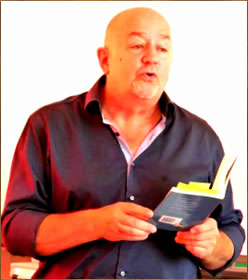
Henk van Zuiden (Apeldoorn, 7 januari 1951)
De Indiase schrijfster en columniste Shobhaa Dé werd geboren op 7 januari 1947 in Maharashtra. Zie ook alle tags voor Shobhaa Dé op dit blog.
Uit: S's Secret
““Have you told Mom, yet?” Pia’s voice was low and anxious. Sandhya shook her head and continued to whisk the sticky mixture of flour and butter in the neat kitchen, which was the centre of the Mehta home.
“How can you bake a cake when you know Morn will be angry? Or are you planning not to tell her at all?” Pia persisted.
Sandhya looked at her younger sister sharply and placed a finger on her own lips. “Sssh... Bhaiya will hear... don’t say anything... please, please... just keep quiet till Bhaiya leaves... he’s late for college again.”
Just then, Siddhartha a tall, athletic eighteen-year-old rushed into the kitchen. “Where’s my skimmed milk... Oh man... I’m late for eco... and the toast is burnt as usual. Sandhya... don’t just stand there with that stupid expression... make me a sandwich... fast... Tell Mom I am going straight to Subi’s place for stats tuitions. And you... little monkey... go wash your hands... filthy as always.”
The two girls looked at their brother, then at each other. “Bhaiya, why don’t you wake up on time? Don’t tell us you have broken the alarm clock again?” Pia piped up.
Sid opened the fridge and made disapproving noises. “Vegetables, vegetables, vegetables - who eats all this rubbish, huh? Who? Look at all this... bhindi, karela, paid/r, kadoo. Hey you Motu, stay away from those chips... tell Mom to organise a decent dinner...
What amazing food we have at Subi’s... fantastic pav-bhaji, nachos... how come we don’t have stuff like that here? His mom is like the best cook in the world. Her crab curry! Oh my God ! Sandhya stop making those silly cakes, make some real food for a change; learn some deadly stuff... like... ok... anything deadly... ok I’m off. Send my tennis gear to the club later... behave yourselves till Mom gets home.”
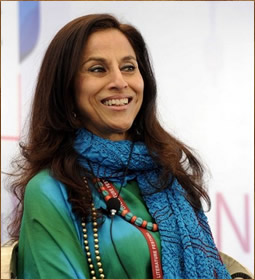
Shobhaa Dé (Maharashtra, 7 januari 1947)
De Franse schrijfster Marie Desplechin werd geboren op 7 januari 1959 in Roubaix. Zie ook alle tags voor Marie Desplechin op dit blog.
Uit: La belle Adèle
“- Tu ne peux pas faire un petit effort ?
Pendant quelques secondes, je me suis demandé ce qu'elle voulait dire. Je n'étais pas plus sale, ni plus impolie que d'habitude. Et d'habitude, je suis plutôt propre et aimable. Mais, comme son regard désolé me détaillait des pieds à la tête, l'évidence s'est imposée. Les efforts devaient porter sur mon allure. Pas sur mon intelligence, mes résultats sportifs, mes capacités relationnelles, mes bulletins scolaires. Sur ma présentation. Quelque chose n'allait pas. Du tout.
- Qu'est-ce qui ne va pas ?
- Tu t'es regardée avant de sortir ?
Elle était à la limite de la grossièreté. Mais je n'ai pas eu le courage de le lui faire remarquer. Car voilà ce que j'avais sur les lèvres : "Tu t'es regardée, toi ?"
[...] Elle s'était certainement, elle, regardée, et longuement. Sortir dans son accoutrement n'est pas une décision qui se prend à la légère. Il faut avoir pesé le pour et le contre.Et assumer. L'aspect de ma tante ne devait rien au hasard, ni à la négligence. Sa robe ouverte sur les genoux, ses cheveux décolorés, le bleu pétrole de ses paupières, les échasses sur lesquelles elle était juchée : tout avait été mûrement réfléchi. Et c'était pire.”
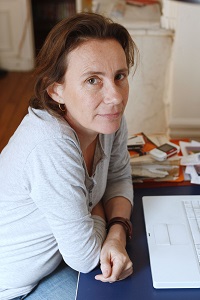
Marie Desplechin (Roubaix, 7 januari 1959)
Zie voor nog meer schrijvers van de 7e januari ook mijn blog van 7 januari 2011 deel 1 en ook deel 2 en eveneens deel 3.
07-01-2016 om 18:24
geschreven door Romenu 
Tags:Frans Kellendonk, Reginald Gibbons, Dionne Brand, Sofi Oksanen, Henk van Zuiden, Shobhaa Dé, Marie Desplechin, Romenu
|

